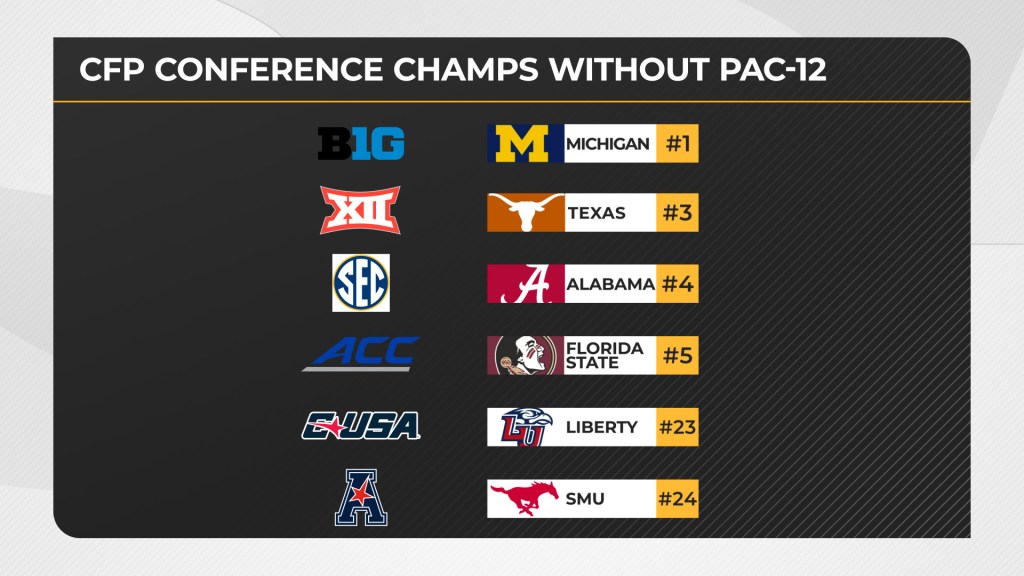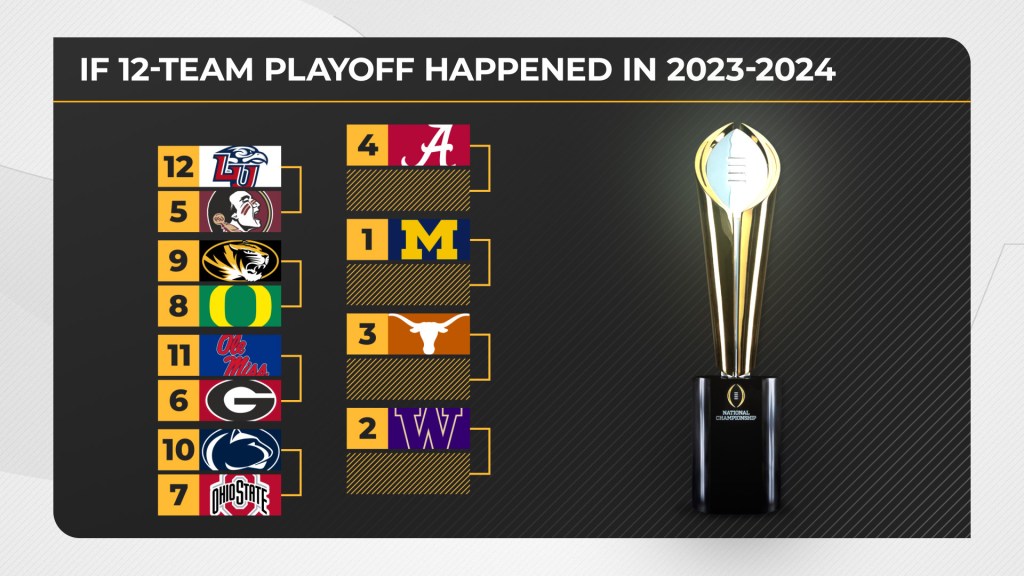
Simone Del Rosario: College football hasn’t even entered the 12-team playoff era and already the format needs to be reworked. With the effective destruction of the Pac-12, CFP tells me when this off season starts, so do conversations about which conference champs get automatic bids into the playoffs.
As it stands, six conference champs still get in. If the format had taken place this year without the Pac-12, that would put 23rd-ranked Liberty and 24th-ranked SMU in the top 6.
And that’s just one wrinkle. What about having athletes play multiple extra games? Will players get their cut of the billions of dollars CFP could make on broadcast rights?
We’re talking with Bob Thompson, former president of the Fox Sports Network and co-founder of the Big Ten Network.
This push for a college football playoff has gone on for a very long time, long before we ended up with a final four type situation. What made now the right time for a 12 team playoff? Why was this decision reached in this decade?
Bob Thompson: Well, you know, there’s the never ending chase of for revenue. And that’s, that’s really what it comes down to. You know, back in the nineties, we were pushing for, uh, when Fox had the BCS, we were really hoping that we would get to a tournament and there was no indication that there was going to be an expansion, uh, beyond the four teams. And not even at that time, there wasn’t even really a play in game. So ESPN was able to put that together. And I think the CFP, the board of managers, which is basically the presidents and commissioners of the major 10 conferences, all felt that to have more opportunity for schools to advance and play for a championship was a smart idea. And it took a lot longer than a lot of us hoped it would, but at least they’re finally there and it clearly looks like next year is going to be interesting. I went back and looked at what the matchups might have been if we had a 12 team this year. And there was some great games. I mean, you’re going to get some blowouts in those early rounds. Don’t get me wrong, that’s just the way it’s going to be. But there were some very interesting first round matchups, which would have led to some very interesting second round matchups as well.
Simone Del Rosario: Yeah, so we’ll see what happens in the coming year. I agree with you, a lot of good games to be had. But we’re asking college athletes to play practically an additional three weeks of play here. Does the NIL play into this at all? Because now college athletes are getting paid, being treated a little bit more like professional athletes to be able to make that ask. Because I know part of the extension of the season to this long, a part of the reason not to do it would have been to protect those athletes, protect their safety.
Bob Thompson: Yes, I mean, certainly that’s a concern. And I think that the conferences have begun to address the injury issues, the mental health issues that the students have to go through in adding a couple of games. It’s going to be an additional ask of the student athletes. But to a man and to a woman, for those who compete in collegiate athletics, they want to play the best and they want to play for the top level. And so I think that this is a situation where it can be good for all involved.
Simone Del Rosario: Now we’re looking at potentially a couple of billion dollars per year to broadcast these games. Any reason that we should see compensation to the players for agreeing to participate in these playoff games? I mean, no one likes to see the bowl games where none of the starters are playing.
Bob Thompson: Yeah, that’s certainly an issue with the bowl games going forward. I mean, I think Everybody probably recognizes that there’s going to be some level of compensation for the student athletes going forward. There’s a variety of NIL cases currently in process or soon to be in process. And at some point, they’ll get it all figured out. I certainly think that these games and bowl games as you know, The CFP games and bowl games as well will follow under that somehow. I think the bowls, The non-CFP bowls are already trying to figure out how they can remain relevant. And that’s important that they do remain relevant. And I think they’ve come to a bit of a realization that they’re going to have to look at some form of compensation model as well. You know, what exactly that is and how it’s divvied up. Um, is to be determined. The other thing I think that probably needs to be given more consideration is some form of insurance policy or something that gives the participants some peace of mind that they’re not going to potentially ruin income producing opportunities down the road to play a single game.
Simone Del Rosario: You brought up something I really wanted to ask you, which was how much do you think this is going to hurt those non-playoff bowls? FBS, is the landscape changing in the next few years?
Bob Thompson: No, I don’t think so. I think there’s going to have to be some changes to them. And I can’t sit here right now and tell you what those should be, but they can still remain relevant. And I think to a lot of these communities that put on these bowl games, you know, it’s a year long love effort amongst those communities to put those games on. I mean, I’ve been around enough of these bowl games over the years to see that. You know, literally the passion that the people who put those games on and the associations that put those kinds of games on it’s, you know, it’s from their heart and they love doing it. And I can’t imagine that it’s going to quit just because we’ve made the tournament, you know, uh, 12 teams instead of four teams.
Simone Del Rosario: CFP has some decisions to make. They have some conversations to be had with what’s happening with the conferences right now. How do you think that the conference realignment is going to change the playoff structure that’s been proposed up to this point?
Bob Thompson: Well, I think you’ll probably end up at a five, seven scenario where the A5 conferences are, which will probably become a four conferences, we’ll get an automatic bid and then one of the G5s will have an auto bid. The rest will go to the highest rated, non-conference champions, playing in, you know, the subdivision that the bowl games all fold into. So I don’t see a huge difference. I mean, right now it’s kind of a six they were talking about, but when the pac-12 imploded, it quickly went to a five seven. And I think the G five guys were hoping they could maybe hang on for another one, but it’s not probably going to happen. So I would expect it’s, it’s a five seven.
Simone Del Rosario: Do you think there’s too much emphasis being placed on conference championships? I mean, we all watch Georgia play. I think a lot of us would have loved to see that caliber of football in the finals.
Bob Thompson: Yes, I think the Conference Championship games, first of all, the revenue producers, and everybody’s under a television agreement for a number of years that has a Conference Championship game included in it. So they’re going to be around at least for the foreseeable future. I think you could get a situation now where the way the tournament sets up, you could have somebody play each other three times, once in the regular season, once in the Conference Champ game, and then once in the tournament as well. So, you know, I don’t know that that’s what anybody necessarily wants, but if it happens, it happens. I think, you know, having three Georgia, Alabama games or three Washington, Oregon games, everybody been very happy with our three Ohio State, Michigan games because they’re great games. And that’s what it’s all about, you know, trying to create the best matchups that are going to draw the most viewers for the TV networks. That way they’ll continue to pay.
Simone Del Rosario: Bob Thompson, thank you so much for your thoughts.
Bob Thompson: My pleasure.












